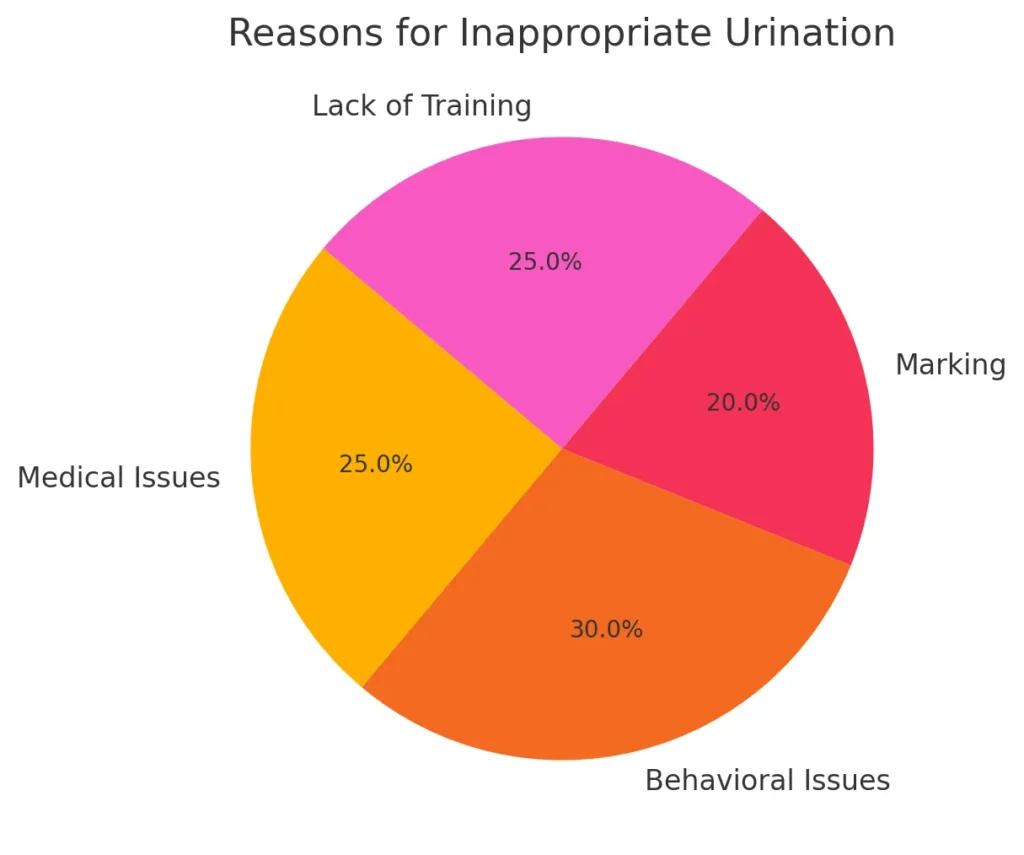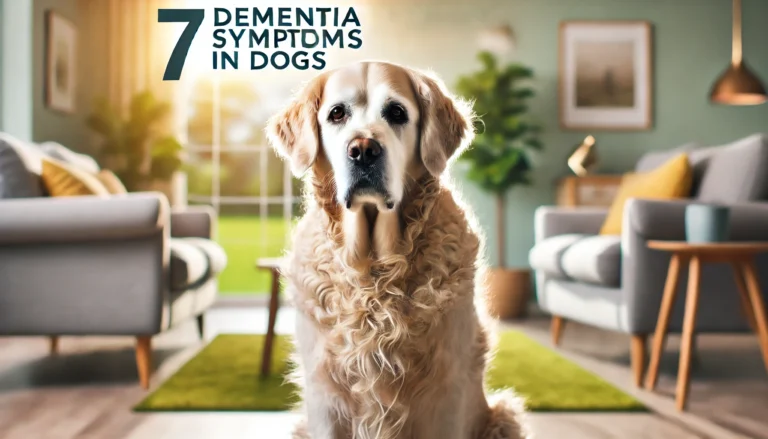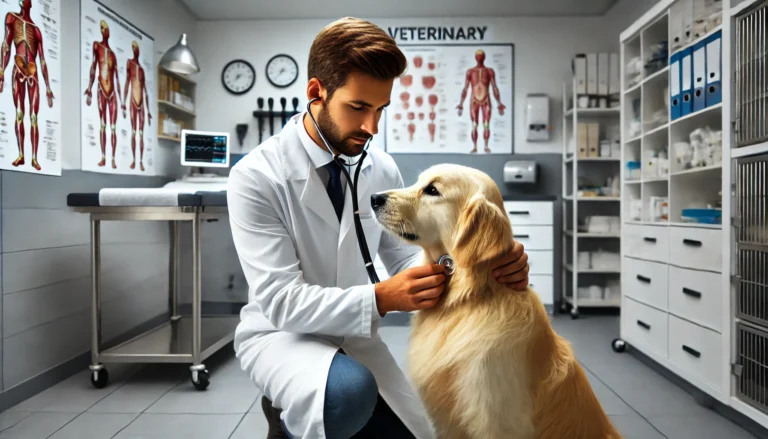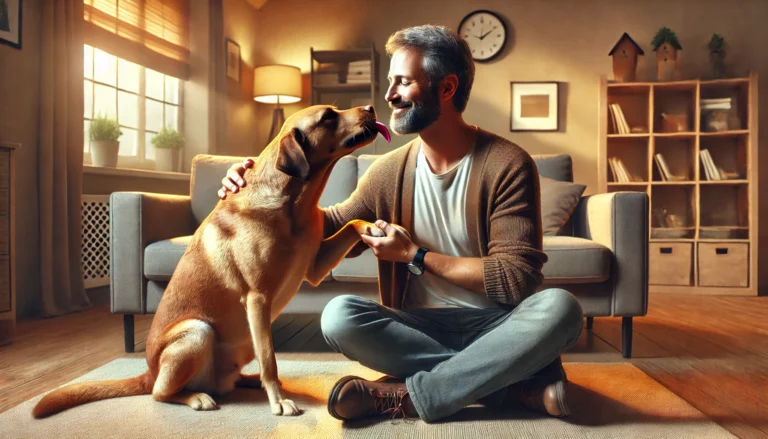why is my dog peeing in the house?

Dealing with your dog peeing in the house can be frustrating for any pet owner. It disrupts the comfort of your living space and poses hygiene concerns. This extensive guide explores the reasons behind this behavior and offers practical solutions to effectively address the issue.

Understanding Why is Your Dog Peeing in the House
A. Normal vs. Problematic Urination
- Puppies: They may pee frequently due to an underdeveloped bladder.
- Adult Dogs: Should have established and predictable bathroom routines; deviations might indicate an issue.
B. Identifying Changes in Urination Patterns
- Noticing changes can help pinpoint the cause, whether it’s a health issue or behavioral problem.
Health-Related Causes of a Dog Peeing in the House
A. Urinary Tract Infections (UTIs)
- Symptoms: Includes frequent, painful urination, sometimes with blood.
- Treatment: Typically involves antibiotics prescribed by a veterinarian.
B. Diabetes and Kidney Issues
- Symptoms: Excessive drinking and urination.
- Diagnosis: Vets may perform blood tests and urine analysis.
- Management: Involves diet changes and, in the case of diabetes, insulin.
Do you know?
Irregular digestion in dogs are often caused by Fleas and ticks. It is always a good option to know some of the best flea and tick medication before going to vet.
Behavioral Causes of dog peeing in the house
A. Anxiety and Stress-Induced Peeing
- Triggers: Changes in the environment, loud noises, or new pets can lead to a dog peeing in the house.
- Management: Create a stable environment, consider behavioral therapy or medication.
B. Territorial Marking
- Reason: Unneutered dogs may mark new or significant areas.
- Prevention: Neutering and environmental management can help.
C. Submissive Urination
- Understanding the Behavior: Occurs during greetings or when feeling threatened.
- Solution: Use calm, non-threatening body language and gentle petting.
Training to Prevent Your Dog Peeing in the House
A. Effective Housebreaking Techniques
- Strategy: Use consistent schedules and positive reinforcement to establish good habits.
B. Addressing Training Regression
- Common in: Changes in the household or routine can unsettle dogs.
- Approach: Reinforce training and provide a stable environment.

Managing the Environment to Stop Your Dog Peeing in the House
A. Routine and Access
- Key to Prevention: Regular and frequent trips outside.
- Tip: Consider dog doors or more frequent walks.
B. Coping with Aging and Incontinence
- Adjustments: More frequent bathroom breaks and possibly incontinence pads.
- Support: Waterproof dog beds and possibly medications for older dogs.

Advanced Solutions for Persistent Issues
A. When to Consult a Veterinarian
- Indications: If the problem persists or is accompanied by other symptoms, it may be time to consult your vet.
B. Seeking Help from Animal Behaviorists
- Recommendation: In cases where training and adjustments don’t work, a behaviorist can provide specialized help.
Conclusion on dog peeing in the house
Understanding and addressing why your dog is peeing in the house is crucial for restoring peace and cleanliness to your home. With the right combination of medical intervention, behavioral management, and training techniques, you can solve this problem effectively.
Why is my male dog peeing in the house all of a sudden?
Sudden indoor peeing in male dogs can be due to several reasons including urinary tract infections, changes in the environment, increased stress, or even medical issues like diabetes. It’s important to consult a vet to rule out health problems first.
How to punish a dog for peeing in the house?
It’s advisable not to punish your dog for peeing in the house. Instead, focus on positive reinforcement. Punishing your dog can lead to anxiety and further unwanted behaviors. Consistently reward your dog for peeing outside to encourage that behavior.
Is my dog peeing inside for attention?
Dogs may pee inside to get attention if they feel neglected or if previous instances of peeing indoors have been met with significant reactions from you. Ensure your dog has adequate play, exercise, and interaction to mitigate attention-seeking behaviors.
How do I stop my dog from peeing inside?
To stop your dog from peeing inside, maintain a consistent outside potty schedule, supervise as much as possible, and use confinement to a crate when not supervised until the habit is broken. Consistently reward your dog for outdoor elimination.
Does vinegar stop dogs from peeing?
Vinegar can deter dogs from peeing in certain areas because of its strong scent. Mixing vinegar with equal parts water can be used as a repellent spray. However, its effectiveness can vary between dogs.
What scent will stop dogs from peeing?
Scents like citrus, vinegar, and ammonia can deter dogs from peeing in specific areas because these are strong and unpleasant to dogs. Citrus-scented sprays or actual citrus peels can be placed in areas where you don’t want your dog to pee.
What is the best homemade dog urine repellent?
A good homemade dog urine repellent can be made using essential oils such as eucalyptus or lemon mixed with water. This mixture can be sprayed in off-limits areas to help deter your dog from marking them.
What really kills dog urine smell?
To effectively eliminate dog urine smell, use an enzymatic cleaner designed for pet odors. These cleaners break down the urine molecules to neutralize the odor fully. Baking soda can also be used to absorb lingering odors.
Does lemon juice stop dogs peeing?
Like vinegar, lemon juice has a strong citrus scent that dogs generally find unpleasant. Using diluted lemon juice as a spray can help keep your dog away from certain areas, but it may require frequent application to maintain its effectiveness.






